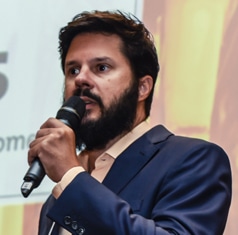
Brazil, biogas and becoming a zero emissions economy
Ahead of his speaking session at the World Biogas eFestival, 19 May 1-3pm GMT (8-10am CST), we have asked Gabriel Kropsch, Vice President, Abiogas (Brazilian Biogas Association) a few questions about the industry in Brazil and what he will be focusing on during his session at the World Biogas eFestival.
What role do you see biogas having in a Net Zero future?
 Biogas is not only a source of renewable energy; it is also the best way to treat organic residues. Biogas can be used as an energy source to produce electricity, heat, mechanical energy and transport fuel in the form of biomethane. Biogas production for energy purposes promotes environmental benefits by treating residues and reducing the amount of methane emitted into the atmosphere. If residues are not treated correctly, bacterial degrading can lead to methane emissions. When used as a source of energy, methane is converted to CO2 which is more than twenty times less harmful for the environment.
Biogas is not only a source of renewable energy; it is also the best way to treat organic residues. Biogas can be used as an energy source to produce electricity, heat, mechanical energy and transport fuel in the form of biomethane. Biogas production for energy purposes promotes environmental benefits by treating residues and reducing the amount of methane emitted into the atmosphere. If residues are not treated correctly, bacterial degrading can lead to methane emissions. When used as a source of energy, methane is converted to CO2 which is more than twenty times less harmful for the environment.
Since it is produced from residues, net CO2 emissions are negative, when considering the Life Cycle Assessment approach. That means that biogas energy products are removing CO2 from the atmosphere. In this sense, biogas’ role in a net zero future is much more than a source of renewable energy and a way to reduce residues from agricultural and industrial activities as well as municipal solid wastes (MSW). Biogas production can also balance emissions from fossil fuel consumption, allowing the world to continue using petroleum products during transition into a zero emissions economy.
What are the largest obstacles your region/country needs to overcome in order for the biogas industry to reach its full potential?
The largest obstacles today are the lack of knowledge and Information mostly by the potential biogas producers, investors and banks. There is also a challenge regarding costs reductions. Also, although the whole regulatory framework is in place, there is still a need for predictability from energy planning.
What is the most exciting/promising biogas project in your region at the moment?
There are various interesting projects in Brazil, specially the ones that use sewage and Municipal Solid Wastes to produce electricity and biomethane. One of them, in São Paulo, has an installed capacity of more than 29 MW of electricity production. Another promising biogas project with 21 MW of installed capacity is under construction and is going to use residues from the sugar and ethanol industry. This industry has enormous potential for biogas production since Brazil is the largest sugarcane producer and second largest ethanol producer, but investments in biogas production using residues from ethanol production are quite low.
What will you be focusing on your presentation at the World Biogas eFestival?
Abiogas presentation will focus on showing the evolution of Brazilian biogas industry, pointing out the opportunities and constraints.
…..
Hear more from Gabriel Kropsch during the World Biogas eFestival 2020, 18-21 May.


